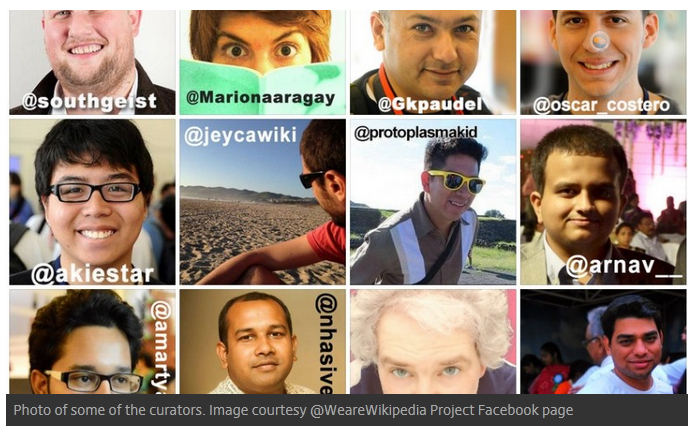This Twitter Account Puts a Face to the Unsung Volunteer Editors Behind Wikipedia
Click to read the post published on Global Voices here.
 |
|---|
They dedicate a tremendous amount of their time to contribute and edit articles, but for no pay (editors work as volunteers) and for little public recognition – their work is credited via their usernames tucked away in the entry's edit history.
Now, one initiative is trying to shine the spotlight on these hard-working “Wikipedians.” WeAreWikipedia is an unofficial project that brings on a different editor each week to curate information regarding their favorite Wikipedia pages and tweet them using the handle @WeAreWikipedia. So far, 19 people representing 17 different language Wikipedias have curated the account.
WeAreWikipedia explains on its blog that it was inspired by a weekly rotation curation handle @WeAreBangalore created by social media strategists from the Indian city of Bangalore in October 2013 to create a space for Bangaloreans to tell their stories, give their opinions or simple connect with other active social media users in the area.
Admin: Most of u r not aware that, one of our previous curators @psubhashish was inspired by us and started global #RoCur @WeAreWikipedia :)
— Bangalore/Rajeev (@WeAreBangalore) June 17, 2014
@WeAreBangalore in turn took its cue from the highly successful @sweden, which turns over the Twitter handle to a different Swede every week as a sort of citizen ambassador program.
The WeAreWikipedia curators also tell personal stories and explain the technicalities of publishing and editing Wikipedia to any readers who ask.
Wherever I go, local Wikipedians are so welcoming and so open to collaboration. I have made friends all around the globe.
— WeAreWikipedia (@WeAreWikipedia) junio 17, 2014
Curators often focus tweets on their Wikipedia language community and country. Two women editors from India, Noopur Raval and Netha Hussain, dedicated many of their publications to facts about women’s rights, issues and development in India while curating the handle during Women’s History Month in March. They also drew attention to an edit-a-thon held in Bangalore that brought 90 women to write about 77 articles related to women in India.
Mariona Aragay, an editor for the Catalan Wikipedia, made a related call for more women editors while she was at the helm of @WeAreWikipedia:
As a wikipedian, it concernes me the low ratio of #woman editors: if you’re a wiki-girl, let us know your experience! #gendergap @wikiwomen
— WeAreWikipedia (@WeAreWikipedia) June 4, 2014
Curators also highlight community events, such as Odisha Dibasa 2014, a gathering at the end of March 2014 of the Odia-language Wikipedia community in the capital of the Indian state of Odisha, where the language is predominantly spoken.
Diptiman Panigrahi, an Odia editor who curated @WeAreWikipedia during the event, talked about his week in a blog post for The Centre for Internet and Society in India:
It was a wonderful experience curating WeAreWikipedia without even much time. Meeting the entire Wikimedia global community was even more fun when I was telling happenings of my own community. I hope to take part in more of such collaborative global issues like this.
You can follow WeAreWikipedia on Twitter, Facebook and on their blog.


